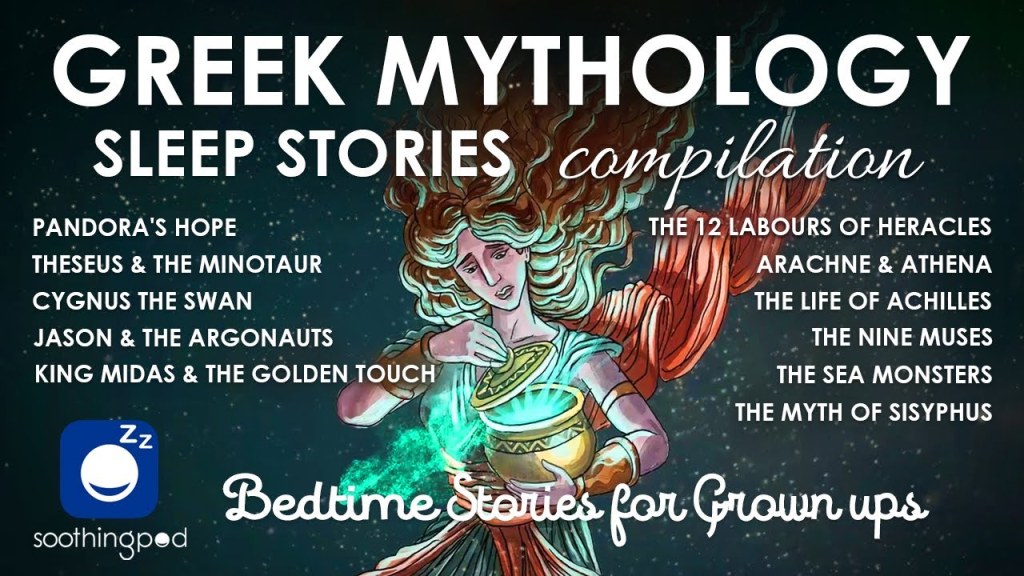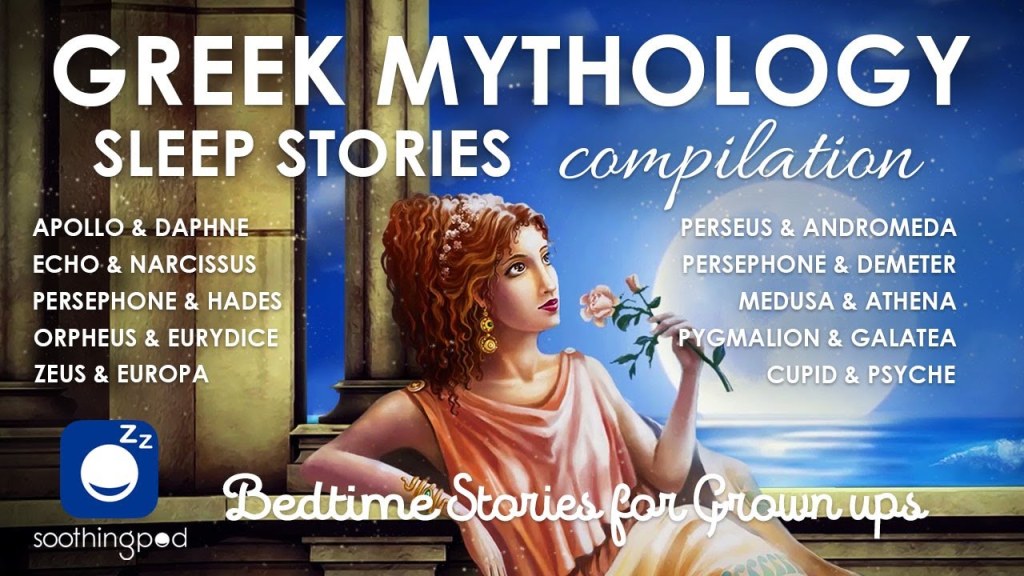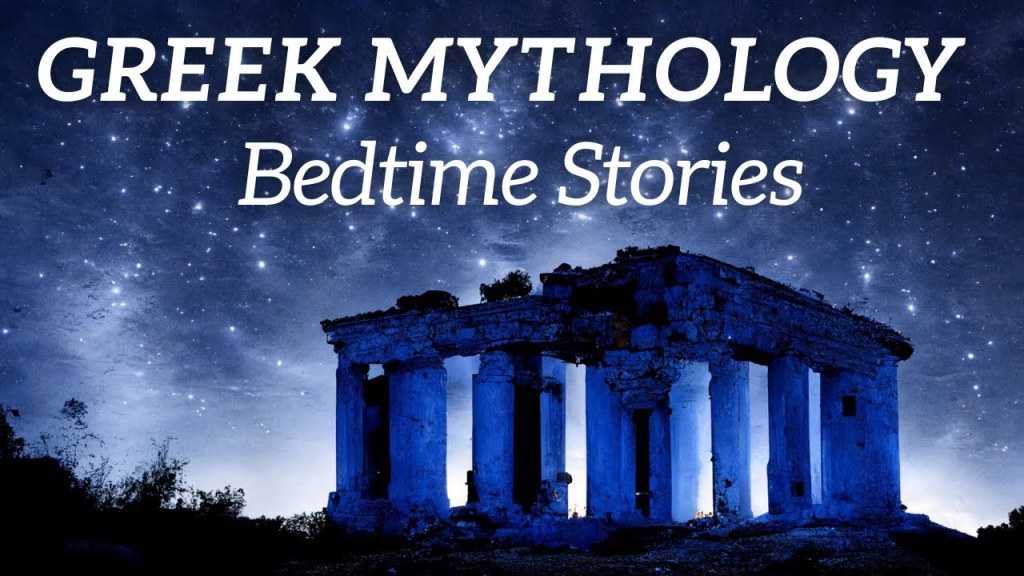Unveiling The Enchanting Bedtime Stories Of Greek Mythology: Dive Into A World Of Legends And Magic!
Bedtime Stories Greek Mythology: Unveiling the Legends of Ancient Greece
Introduction
Dear Readers,
3 Picture Gallery: Unveiling The Enchanting Bedtime Stories Of Greek Mythology: Dive Into A World Of Legends And Magic!



Welcome to a world where gods and goddesses ruled the skies, mythical creatures roamed the earth, and heroes embarked on epic quests. In this article, we will delve into the enchanting realm of Greek mythology, specifically exploring the captivating bedtime stories that have been passed down through generations. These tales not only entertain children but also provide valuable insights into ancient Greek culture, beliefs, and values.

Image Source: ytimg.com
In this comprehensive guide, we will unravel the mysteries of Greek mythology, exploring the who, what, when, where, why, and how of bedtime stories from ancient Greece. We will also discuss the advantages and disadvantages of sharing these stories with children, as well as answer some frequently asked questions. So, sit back, relax, and prepare to be transported to a world of gods, heroes, and fantastical creatures.
Table of Contents
What are Bedtime Stories in Greek Mythology?
Who are the Characters in Greek Mythology?
When and Where Did Greek Mythology Originate?
Why Are Greek Mythology Bedtime Stories Popular?
How Can Bedtime Stories from Greek Mythology Benefit Children?
Advantages and Disadvantages of Bedtime Stories from Greek Mythology
Frequently Asked Questions
Conclusion
Final Remarks
What are Bedtime Stories in Greek Mythology? 🌙
Greek mythology is a collection of stories and legends that originated in ancient Greece. These stories revolve around the lives and adventures of gods, goddesses, heroes, and mythical creatures. Bedtime stories in Greek mythology are a subset of these tales, specifically tailored to entertain and educate children before they drift off to sleep.

Image Source: ytimg.com
These stories are filled with thrilling adventures, moral lessons, and larger-than-life characters, making them perfect for captivating young minds. Children can immerse themselves in the magical world of gods and goddesses, exploring fantastical realms, and learning about ancient Greek culture and traditions.
Some popular bedtime stories from Greek mythology include the stories of Prometheus and Pandora, Perseus and Medusa, and Theseus and the Minotaur. These stories are often passed down through oral tradition or read from books to young children, ensuring that the ancient myths continue to captivate and inspire new generations.
Who are the Characters in Greek Mythology? 🌟

Image Source: ytimg.com
Greek mythology is brimming with fascinating characters, each with their own unique traits and stories. From mighty gods and goddesses to cunning heroes and fearsome creatures, these characters bring the tales to life. Here are some of the most notable figures in Greek mythology:
1. Zeus: The king of the gods and god of the sky.
2. Hera: The queen of the gods and goddess of marriage and childbirth.
3. Poseidon: The god of the sea and earthquakes.
4. Hades: The god of the underworld.
5. Aphrodite: The goddess of love and beauty.
6. Apollo: The god of music, poetry, and prophecy.
7. Artemis: The goddess of the hunt and the moon.
8. Hercules: A mighty hero known for his incredible strength and twelve labors.
These are just a few examples of the vast pantheon of gods and goddesses, as well as the numerous heroes and creatures, that populate Greek mythology and make the bedtime stories so captivating.
When and Where Did Greek Mythology Originate? 📜🗺️
Greek mythology has its roots in ancient Greece, dating back to around the 8th century BCE. The stories were initially passed down through oral tradition, with storytellers recounting the tales at festivals, gatherings, and even in homes. It was not until later that these stories were transcribed into written form, preserving them for future generations.
Ancient Greece was a collection of city-states located in the southeastern part of Europe, with Athens and Sparta being two of the most prominent. Greek mythology played a significant role in the religious and cultural practices of these city-states, shaping their beliefs and rituals.
Why Are Greek Mythology Bedtime Stories Popular? 🌌
Greek mythology bedtime stories have stood the test of time and continue to captivate audiences of all ages. Here are some reasons why these tales remain popular:
1. Rich storytelling tradition: Greek mythology is renowned for its compelling narratives, filled with drama, action, and moral dilemmas. These stories have been carefully crafted to entertain and teach important life lessons.
2. Fascinating characters: The gods, goddesses, heroes, and mythical creatures of Greek mythology are larger than life, with their extraordinary powers and flaws. Children are drawn to these captivating characters and their epic adventures.
3. Educational value: Bedtime stories from Greek mythology offer a unique opportunity for children to learn about ancient history, culture, and values. They teach important lessons on topics such as bravery, perseverance, and the consequences of one’s actions.
4. Imagination and creativity: The fantastical elements of Greek mythology stimulate children’s imagination and encourage creative thinking. They transport young minds to magical realms and inspire them to create their own stories and artwork.
5. Connection to the past: Greek mythology provides a link to the past, allowing children to explore the beliefs and traditions of ancient civilizations. It fosters an appreciation for history and cultural heritage.
How Can Bedtime Stories from Greek Mythology Benefit Children? ✨
Bedtime stories from Greek mythology offer numerous benefits for children’s development and growth. Here are some ways in which these stories can benefit young minds:
1. Moral lessons: Greek mythology is replete with stories that convey important moral lessons. Children can learn about virtues such as bravery, honesty, and loyalty through the trials and triumphs of the mythical characters.
2. Vocabulary expansion: Exposing children to ancient Greek names, terms, and concepts can expand their vocabulary and linguistic skills.
3. Cultural understanding: Greek mythology provides insights into the beliefs, values, and traditions of ancient Greek society. It fosters cultural understanding and appreciation for different civilizations.
4. Imagination and creativity: Immersing themselves in the enchanting world of Greek mythology can enhance children’s imagination, creativity, and storytelling abilities.
5. Critical thinking: Analyzing the actions and motivations of the characters in Greek mythology encourages children to think critically, make connections, and explore moral dilemmas.
Advantages and Disadvantages of Bedtime Stories from Greek Mythology:
While bedtime stories from Greek mythology have many benefits, it’s essential to consider both the advantages and disadvantages. Let’s explore some of them:
Advantages:
1. Educational value: Greek mythology stories offer a unique educational experience, teaching children about history, culture, and moral values.
2. Enhancing imagination: The fantastical elements of these stories stimulate children’s imagination and creativity.
3. Moral lessons: Many Greek myths convey important moral lessons, helping children develop a sense of ethics and values.
4. Cultural appreciation: Exploring Greek mythology allows children to appreciate and respect different cultures and their contributions to humanity.
5. Bonding time: Reading bedtime stories together creates a bond between parents and children, fostering a love for literature and storytelling.
Disadvantages:
1. Violence and mature themes: Some Greek myths contain violence, depictions of gods’ wrath, and adult themes that may not be suitable for very young children.
2. Cultural differences: Some stories may be difficult for young children to understand due to their cultural context and references.
3. Confusion with reality: Young children may have difficulty differentiating between mythological stories and reality, leading to confusion.
4. Fear and nightmares: The portrayal of monstrous creatures and gods’ wrath may frighten sensitive children, potentially leading to nightmares.
5. Lack of diversity: Greek mythology predominantly focuses on ancient Greece, limiting exposure to other diverse cultures and mythologies.
Frequently Asked Questions:
1. Are bedtime stories from Greek mythology appropriate for all ages?
Yes, but parents should exercise discretion when selecting stories, considering the maturity and sensitivity of their children.
2. How can I make bedtime stories from Greek mythology more engaging for my child?
You can incorporate interactive elements, such as asking questions, encouraging your child to imagine alternate endings, or even acting out parts of the story together.
3. Can bedtime stories from Greek mythology be read in any order?
Yes, the stories are often standalone, allowing flexibility in the order they are read.
4. How can I address mature themes or violence in Greek mythology stories with my child?
You can use age-appropriate language to explain the context and discuss the moral lessons or values conveyed in the stories.
5. Should I avoid sharing stories from other mythologies alongside Greek mythology?
No, exploring different mythologies can broaden children’s perspectives and foster a sense of global citizenship. However, it is essential to provide context and explain the cultural variations.
Conclusion
Bedtime stories from Greek mythology offer a window into an ancient world filled with gods, heroes, and mythical creatures. These captivating tales entertain and educate children, providing valuable lessons in morality, culture, and history. Despite their age, these stories continue to enchant audiences of all ages, fostering imagination, critical thinking, and cultural appreciation.
So, dear Readers, let’s embark on a journey through the tales of Greek mythology, passing on these timeless stories to future generations and keeping the ancient world alive in our hearts and minds.
Final Remarks
In this digital age, where captivating stories can be found at the touch of a button, let us not forget the magic of traditional bedtime stories. As with any form of storytelling, it is essential to adapt and modify the content to suit the needs and sensitivities of each child.
Please note that some stories may contain mature themes or depictions of violence, so parental discretion is advised. It is also crucial to provide children with a diverse range of stories from various cultures and mythologies to cultivate a broader worldview and appreciation for our shared humanity.
Friends, let us continue to share the wonders of Greek mythology and ignite the imaginations of young minds, fostering a love for reading, storytelling, and the rich tapestry of our collective human history.
This post topic: Children's Literature
